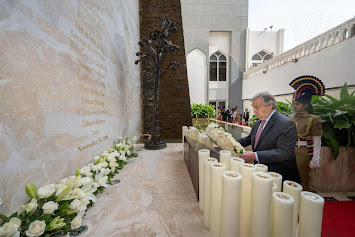Terrorism on the rise across the world, but UN unable to fight it resolutely
United Nations, Nov 26 (IANS) In the 15th year after the 26/11 Mumbai terror attack by Pakistan-based terrorists the world has seen another attack patterned on it on a far larger scale in Israel, yet the world organisation is unable to resolutely fight it.
The Comprehensive Convention on International Terrorism (CCIT) proposed by India in 1996 is languishing in limbo because some countries want their favoured terrorists to be glorified as “freedom fighters”.
The Security Council’s committee on issuing sanctions against terrorists cannot declare Sajid Mir, the mastermind of 26/11, a global terrorist because he is under the protection of China.
And, a resolution adopted by the General Assembly on the Gaza conflict that followed the 7/10 Hamas attack would not even name the terrorist group and condemn it because of the opposition by several countries which defeated an amendment proposed by Canada to hold it responsible.
India abstained on the resolution’s voting on the resolution because it did not explicitly condemn terrorism.
Speaking after the vote, India’s Deputy Permanent Representative Yojna Patel firmly laid out New Delhi’s position: “The world should not buy into any justification of terror acts. Let us keep aside differences, unite, and adopt a zero-tolerance approach to terrorism.”
The justification of terrorism has prevented the adoption of the CCIT and Pakistan presents the prime example of this ideology.
In opposing the CCIT, its Permanent Representative Munir Akram has said that there is a clear differentiation between “acts of terrorism” and “the legitimate struggles for self-determination of people under foreign and colonial occupation” — a justification in his view for terrorism by Pakistan-based and supported terrorist organisations that should be exempt from counter-terrorism action through a global pact.
He said that it was the position of the Organisation for Islamic Cooperation, the group of Muslim nations.
UN Secretary-General Antonio Guterres has dismissed attempts to differentiate between acts of terrorism and terrorists.
During a visit to Mumbai last year, he visited the memorial to the 26/11 victims and called terrorism an “absolute evil” that “no reasons, no pretexts, no causes, no grievances” can justify it.
A day after the 26/11 attack began, the Security Council in what is becoming an increasingly rare show of unanimity proclaimed its members’ “determination to combat all forms of terrorism, in accordance with its responsibilities under the Charter of the United Nations”.
It also declared “that any acts of terrorism are criminal and unjustifiable, regardless of their motivation, wherever, whenever and by whomsoever committed”.
Ban Ki-moon, who was then the Secretary-General, said that he was determined that the UN plays a lead role in dealing with terrorism.
He said that the perpetrators of the Mumbai attack should be brought to justice.
As the world stood aghast at the terrorism in Mumbai, the Council’s sanctions committee on terrorism within weeks declared the Lashkar-e-Taiba (LeT) a global terrorist organisation and imposed sanctions on it.
Three of its leaders, the boss Hafiz Saeed, operations head Zakir Rehman Lakvi, and finance chief Haji Mohammed Ashraf were also declared international terrorists by the panel that is formally known as the “1267 Al Qaeda Sanctions Committee” for number of the resolution setting it up and had their assets frozen and travels banned.
But after that, China began blocking sanctions against other LeT operatives involved in the Mumbai terror attack.
In January, it relented and allowed sanctions to be imposed on Abdul Rehman Makki, but as recently as June, it blocked action against Sajid Mir, the mastermind of the 26/10 attack.
India’s Permanent Representative Ruchira Kamboj told the Council bluntly that its failure to deal with terrorists challenges its credibility.
She told the Council in September, “The working methods of the UNSC (Security Council) Sanctions Committees continue to dent the credibility of the UN Security Council.”
During its tenure as an elected member of the Council that concluded at the end of last year, India headed its Counter-Terrorism Committee.
Kamboj, as the panel’s chair, convened a session in Mumbai, where the 15 members of the Council can see and feel the impact of 26/11, and in New Delhi.
Survivors of the attack spoke directly to the Council members in Mumbai about their trauma and their determination to not be defeated and appealed for action against terrorism.
One of those addressing the Council in Mumbai through a video link was Moishe Holzberg, who as a two-year-old baby survived the LeT attack on a Jewish centre in Mumbai with the help of his Indian nanny while the terrorists killed his parents.
He said, “It is very important that you find new ways to counter terrorism so that no one will have to go through what I have gone through.”
But a year later, like they had in India swooping in with unconventional tactics, terrorists struck his homeland with far greater fury and focused more directly on Jews as the world stood by.
(Arul Louis can be contacted at arul.l@ians.in and followed at @arulouis)
–IANS
arul/khz




Comments are closed.